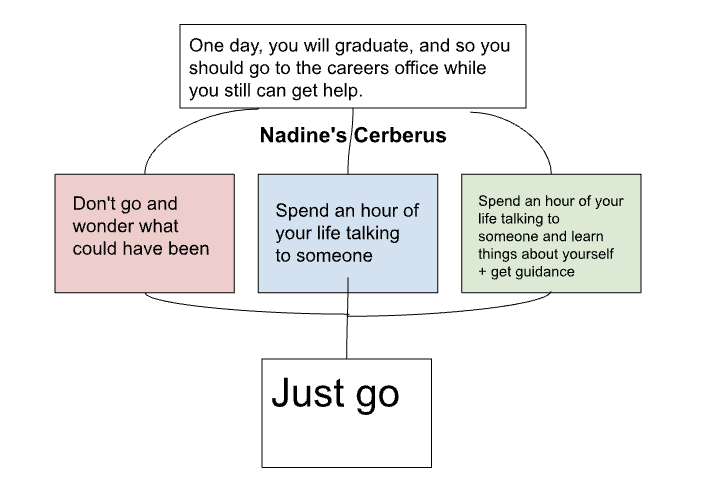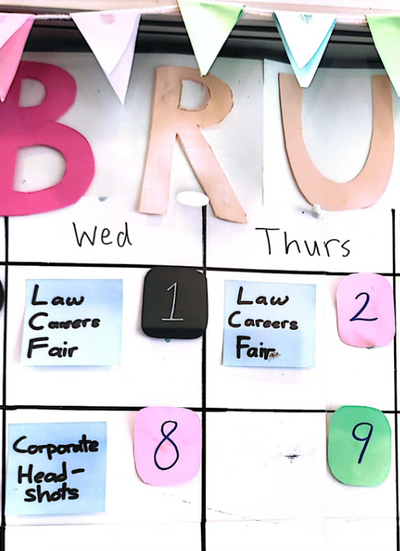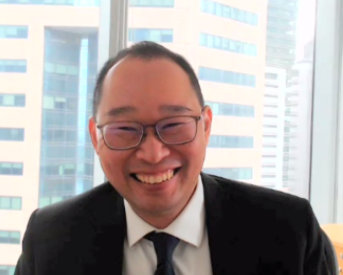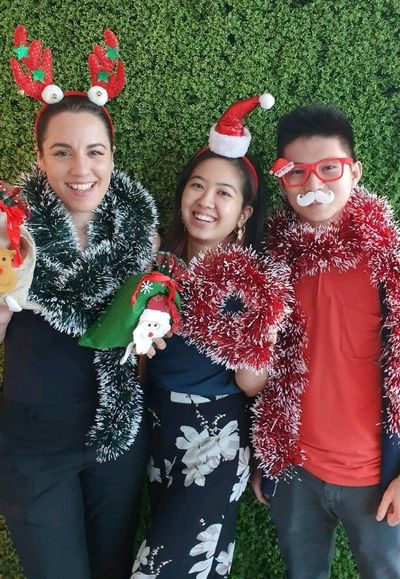
WongPartnership is a premier law firm, specialising in various fields of law including mergers and acquisitions. They have also been involved in high-profile litigation and arbitration matters, as well as advisory and transactional work. Recently, the firm launched WPG, a regional law network, comprising WongPartnership and its member firms from countries around the region.
Here we interview Ms. Audrey, a Partner in the Corporate/Mergers & Acquisitions Practice and Mr. Jared, a Partner in the firm’s Commercial and Corporate Disputes Practice.
J: Thank you for the seminar just now. We were both there and it was really helpful. You’ve spoken a lot about the type of work that WongPartnership does, and its work culture, but what do you think is the most unique aspect of your firm that sets it apart from the other firms?
Audrey: It would be about how young we are. Even though we are a big firm, we are only 25 years old. From a leadership and management perspective, a lot of the very senior partners, even though they have a lot of responsibilities, they are also younger compared to some of the other big firms. Because of that, we are very interested to keep abreast of the developments in the legal profession. Last year, we were the first firm to adopt both Contract Express and Luminance, as part of our decision to embrace legal technology through Artificial Intelligence. It is also about being able to keep up with the times as well. From that perspective, looking at how much the firm has grown over the past 25 years, we do know very well that we have to be able to keep up with the changes. Having a young, vibrant leadership helps a lot in that respect.
Rumour has it that working at WongPartnership entails tough work-life balance. Is it true?
Jared: I think all of the big firms, and even the medium-sized firms, are going to have the same demands of the younger associates. It’s hard to run away from that because it’s just the nature of the profession. I don’t think that people are not understanding. If you do have other commitments or if you have other things that need to be done, as long as you have cleared your work or you are able to tell others that you’d be able to get on with this [piece of work] at a certain point of time, it’s not going to be a place where you need to be sitting at your desk all the time. No one is going to be walking by, and wonder where is this person, why is he not sitting here?
Audrey: I think at the end of the day it’s a question of what the expectations are. To be honest, when young lawyers first start out, the learning curve is very steep. From that perspective, individually, you need to decide for yourself what you want to get out of your profession. Do you want to be the best in what you do? If so, you have to put in the hours. But on the other hand, I think the firm is also aware that there are associates who are married who have kids. At the partner level, we have our own families, so it’s not the case that we expect everyone to stay and sit in the office till midnight every day, just to finish the assignment. On the other hand, you need to understand that if you choose to join a big firm, your clients will be of a particular make-up, and the nature of the disputes you handle will be more complex, and because of that, you do need to spend time to identify the issue and figure out ways to deal with it. That’s something you cannot run away from. Most associates would find a way to cope. From time to time, if you feel very tired and need a breather, you can always talk to your partners. For our own associates, we have secondment opportunities, whether it’s to other law firms overseas or to clients. Some of them see it as a change of environment or a breather.
J: Thank you for that. What kind of people do you think would fit in at WongPartnership?
Audrey: Someone who can work as a team. I don’t think we are looking for any individual players. During interviews, we always ask, “What have you heard of WongPartnership? What’s your impression of WongPartnership? Why do you want to apply to WongPartnership?” They will tell us, “Oh, I’ve heard that WongPartnership is like a big family.” The relationship between the partners and the associates is close. We work as a team. We are not looking for someone who wants to be the only voice. We have different opinions, and we may argue very heatedly on some legal points. But at the end of the day, we respect each other’s opinions.
J: What do you hope that law students can take away from this fair?
Audrey: I hope that they find out more about the firm, and rather than asking just about the perks and how much will they are paid if they sign up for the TC [training contract]. Find out more about the culture of the firm. Also, think about the personalities you have met and, through talking to the partners and the associates, whether or not this is the kind of firm that you will want to join.
J: On your point regarding the culture, in less than five words, what is the culture in WongPartnership?
Audrey: Family oriented, in the sense that the entire firm is like one big family, and that also looks out for our personal family and well-being as well. I don’t believe that being a lawyer is the be all and end all. Like what I said, having good grades is not the be all and end all, studying is not the be all and end all. To be able to continue in this profession, you need to have a support system.
Basically, something can last you through. You have to figure out what drives you as a person. We respect the fact that everyone has their own families; you have your own demands, whether it is as a young parent, or as a child who needs to help out at home. In that sense, it’s not just family oriented in that we are one big family, but also because we do understand that everyone has their own time constraints and needs.
J: Oh that’s nice. it’s very pro-family … when it doesn’t conflict with work?
Audrey: I think it’s a matter of both. If it’s a weekend and something needs to get done, but the associate says that I have something on and I can only look at it tonight, [the partner would reply] either “It’s okay, just email me when you’re done.” Or if it’s really urgent, then the partner will just do it [himself].
Jared: To add on, I’d say that the point is trust. In this kind of system, there needs to be trust between the partner and the associates. Between everyone on the team, everyone is there to make sure that the piece of work is going to be done better. There is a lot of cohesiveness in that sense. Also, because it is a young firm, we are more receptive to changes that people want to push for, even at the lower levels. In that sense, there’s a lot of trust that the partners give to the associates. For example the WongPartnership Moot is in its tenth run this year – that was started out by one of our current partners when she was an associate. At that point in time, only Drew & Napier had Advocacy Cup and A&G [Allen & Gledhill] had Mallals [B.A. Mallal Moot]. She thought that we wanted a moot of our own too. That also stems from the fact that it’s a young firm and everyone has good ideas; it’s not just the partners who are able to improve the firm, to make the firm a better place.
J: With regards to your point on trust, I’ve read this anonymous opinion letter written by a partner at a law firm and it says that the firm was very receptive to the associates’ requests, for example, later starting hours, or to foot the cab fare when they work late. After the partners implemented everything that the associates suggested, the associates left the firm anyway.
Audrey: I think it’s about trust and also welfare. There are certain things put in place to enhance welfare. Things like cab claims, dinner claims, and we don’t watch the clock. Those things are there and to a certain extent we are flexible. We rely on associates to not abuse the trust. If you work late and you need to take the morning off to deal with stuff, most partners will generally not have an issue. It’s really about the level of trust that the partner has in the associate as well.
J: A more personal question that we can relate to as well, how was your experience like in law school back then?
Audrey: Less stressful than it is for you now? I was from the class of 2005. At that time, internships were not really the norm, it was what we do for the experience. At the end of the day, it’s about the relationships that you build in law school, which continues till today. For me, yes, the subjects were tough. There will be this time before exams when everyone is mugging. But by and large, I think we do take part in a lot of activities outside of studying as well. I think some of those you still have, like law camp, and rag and flag. I actually did law camp twice. The first time was as a rising second year for the incoming freshmen and then because my classmates were in law club, I got roped in in my second summer and did it for the second time. But it was pretty fun. In between [the activities] you would find some time to sign up for internships. Internships, by and large, were not things we religiously do. To me at least, compared to practice, law school was a pretty relaxed point in time. We had lessons but most of the time, it was alright!
Jared: My grades were not that good, so I could not relax quite that much. I was in Law Club, and we were the first batch that started out in Bukit Timah. We started a lot of initiatives that are still relevant even now. Like a lot of the sports groups.
J: If you could re-do law school, what would you have done differently?
Jared: I would have studied a little bit harder, so I wouldn’t have to scramble so much towards the end. I was a bit too chill because I did too much of the other stuff, unfortunately.
J: On that note, do you have any advice for law students like us?
Jared: I think law school offers a lot of opportunities so make the most of what you can through law school. For example, if you want to be more involved in pro bono work, there will be an avenue for you to get that side of your interests fulfilled.
Audrey: Try to also take part in activities that are outside of law school. Especially now that law school is away from the main campus. I spent my entire life as a law student back at the Kent Ridge campus, and I took part in quite a number of non-law related activities. It helps you gain a better understanding of the different ways that people interact. A number of people in law school would come from the same background, the same schools, so in a sense, you are all quite homogeneous and like-minded. When you go out of law school, the people you encounter may not necessarily be from the same background. Thus it’s about open-mindedness — being open to new experiences and interaction with other people.
J: During the talk, you mentioned joining CCAs to beef up your resume. Then what about activities that you do out of school that are not affiliated with NUS?
Audrey: Yeah, you can always list those in your resume. We have golfers who tell us what their handicap is. It is not necessarily limited to things you do in school. It’s whatever you find most interesting about yourself. Ask yourself that question that you asked us in the beginning — what is unique about our law firm. So, what is unique about yourself?
J: But how do you differentiate between content that you should be sharing over the break with your colleagues from content that you should present when you are asking to be hired?
Audrey: If you think there’s an interesting fact about you, there is no harm putting it in the CV. If the interviewer finds it interesting enough, that may be a conversation topic. If not, the interviewer will focus on something else that is in your CV. We have seen people who tell us they have started businesses, like blog shops. It shows us a different side [of you]. For example, if you have experience managing a small business, that becomes an experience that you have that the next candidate may not.
J: WongPartnership has consistently shown a lot of initiative in rolling out new developments such as AI. I was wondering if there are other sneak peeks that you could maybe offer us, of developments that are in the pipeline?
Audrey: AI is a developing area and with the increasing demands facing lawyers, there is a need to innovate and look into how we can use technology to improve the way we work. We started with the announcement on Contract Express and Luminance and are also evaluating other products available out there.
J: How far has AI in your firm progressed so far?
Audrey: Last year we announced two things. Luminance aims to help the workload of the young lawyers who had to sit either in a physical data room or in front of a computer going through hundreds or thousands of documents, so it’s meant to help that process. That is actually one of the key drivers – efficiency and to help manage the workloads of the junior associates. The second thing we have announced is Contract Express. Contract Express is a document automation tool. If you talk to any young associate out there, the bugbear is probably proofreading. And proofreading not just for legal things, but also formatting and clause references. Contract Express allows people to fill in a questionnaire and then produce a document that is nicely formatted. Clause references will be correct, and it saves the poor associate who is proofreading the document before it will be sent to the client at 2am in the morning. We have started using these two tools and the question is how much we can scale up from there. I think the technology out there is developing. There will always be new and more things that will come up in the market, and the question will be whether it makes sense for the firm to adopt more of them in the future. Technology will hopefully help restore some work life balance for the junior associates.
J: On the topic of work life balance, could you run us through a typical day in the life of a WongPartnership lawyer?
Audrey: I guess if you are lucky, there’s no typical day and it depends on whether you have a meeting. If you have no meeting, official work hours start at 9am. Again, we don’t watch the clock. From there, it’s a question of whether they have meetings. If they have meetings then they’ll go for them; if they do disputes work, they will either prepare for court or they will be in court. If it’s an uneventful day, they will spend most of the day working on the documents or reviewing whatever they need to review or doing research. At the end of the day, lawyers are paid to handle documents so you can’t run away from that.
Jared: Actually, that’s what makes the job interesting, that every day is different.
J: A lot of my peers are very worried about the current glut of lawyers entering the industry. What’s something that law students can do now to differentiate themselves from the crowd and help themselves stand out?
Jared: You have to look at when you are going to get hired, which is five years later. Think about what, at that point of time, is going to be the next big industry. For example, with the One Belt One Road initiative, construction law is going to become a lot more prominent. This is for disputes – it’s going to be something very important in five years’ time. You should start looking at that aspect of work if that is something that you want to do. Don’t look at what is happening now. Obviously now, there is a glut but in five years’ time, where is the legal industry going to be at that point in time? That is where you have to project yourself.
Audrey: Knowledge of languages can help too. If you can speak Chinese and with One Belt One Road, that is something that you have that someone else may not have. The same goes for Bahasa and the other regional languages. Sometimes it’s not about being perfect. I do a lot of Chinese work. After a while, you will realise your clients may not have a very high expectation of how well you speak, as long as they can understand you, and you can understand them. It’s about the can-do attitude: “I know a bit, but I don’t mind trying.” Or being willing to go out of the country. If tomorrow we want to open an office somewhere, and we ask for people who are willing to go there and help. The person who is willing to step up and say, “I’m willing to do it” will, of course, have that in his favour. You cannot just look at Singapore and think “I want to spend the rest of my life here.”








